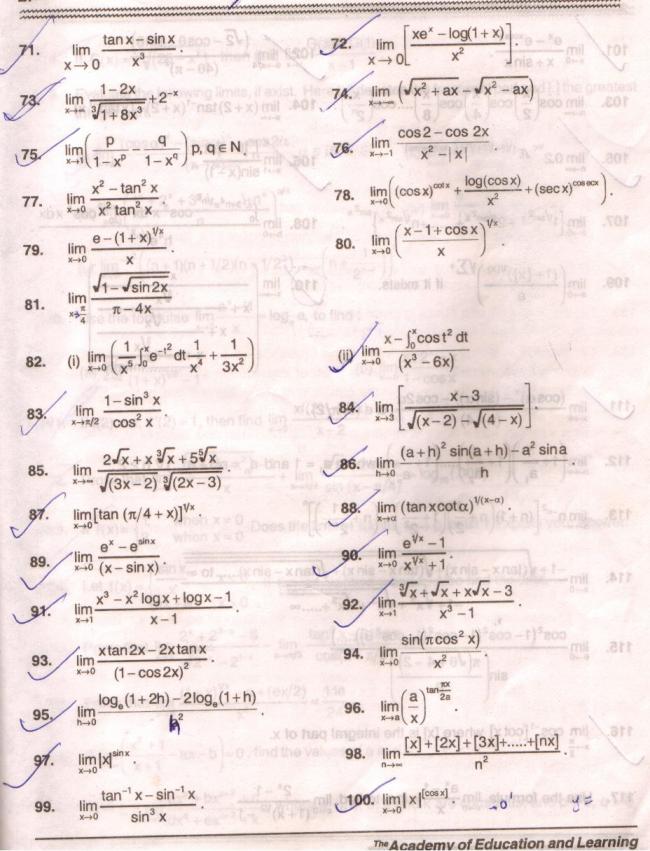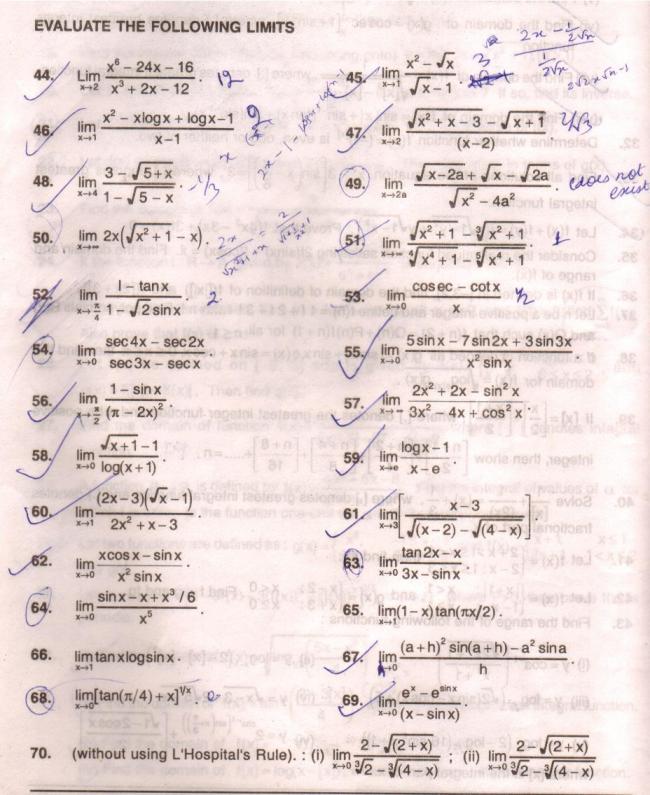U CAN ALWAYS APPLY L'HOSPITAL 80% QUESTIONS GET EASILY SOLVED BY THIS METHOD
Q1. lim(x→2a) [√x-2a + √x - √2a]/[√x2-4a2]
Q2. lim(x→∞)2x(√x2+1 - x)
-
UP 0 DOWN 0 1 85

85 Answers
in first question do the square brackets mean greatest integer function????
second question ka answer 1 tha i was writing working galti se del ho gaya ....
second wala main rationalise and we get
2x(x2 + 1 - x2 ) /√x2 +1 +x
ab divide by x
and we get 2 / 2 bus yeh dhyaan rakhna hai ki x2 approaches infinity then 1/ x2 is zero jab tum root main divide karogay ...
Q4.. lim(x→0)lxl[cosx] where [.] is GINT.
i know this is of the form... (→0)(→0)
but is that 1... i know us par ek QOD bhi tha jo abhi classics mein bhi hai...
is it bcz.
lny = lim(x→0)[cosx]lnlxl
lny = 0 [as [cosx] = 0]
so, y = e0 = 1
Q7 mein
limx-->0 (1+x)1/x=e(1+x-1)/x =e (standard result)
now the ques answer is not defined or limit does not exist
bhaiya what is d/dx((1+x)1/x)?
and Q5. the ans. is coming 3/2 but its given 3/4....
Q6.
\lim_{x\rightarrow 0}\frac{e-(1+x)^{1/x}}{x} =\lim_{x\rightarrow 0}\frac{d/dx(e-(1+x)^{1/x})}{dx/dx} =\lim_{x\rightarrow 0}\frac{d/dx((1+x)^{1/x})}{1}
does this help?
\frac{sec4x-sec2x}{sec3x-secx} =\frac{1/cos4x-1/cos2x}{1/cos3x-1/cosx} =\frac{cos2x-cos4x}{cosx-cos3x}\times\frac{cos3x\times cosx}{cos4x \times cos2x}
Now, I think you need to only use COS A + COS B in numerator and denominator
Q5. lim(x→0)(sec4x-sec2x)/(sec3x-secx)
i know this ones easy but i cant solve it... isme to l'hospital bhi use nahiin ho sakta....
Q6. lim(x→0) [e-(1+x)1/x]/x .... [.] is NOT GINT. its juist square brackets....
Q7. lim(x→0)[(1+x)1/x -e + (ex/2)]/x2
chodo silly doubt very silly.... thread open to new questions but closed for Q4. [3]
ya phir is it the simple reason...
for x→0,
RHL = l0.0000001l0exact = 1
LHL = l-0.0000001l0exact = 1
???
Q1. lim(x→2a) [√x-2a + √x - √2a]/[√x2-4a2]
when x→2a+ then √x-2a is defined.... but when x→2a- then √x-2a is not defined... so will limit exist?? i dont think so......
sandwich ke alawa aur bhi tareeka hai ...........
split gint into fractional part and x
x= [x] + {x}
and then split and solve
q.3)
limit exists.
let,
y= lt x->0 |x|sinx
ln y = lt x->0 sinx ln|x|
=> ln y = lt x->0 (sinx/ x) (ln|1+(x-1)|/ (x-1)) . x(x-1) =0
=> y=1
q.3)
limit exists.
let,
y= lt x->0 |x|sinx
ln y = lt x->0 sinx ln|x|
=> ln y = lt x->0 (sinx/ x) (ln|1+(x-1)|/ (x-1)) . x(x-1) =0
=> y=1 ans.
no asish q3 is correct and the answer is one
first understand that u cant do it directly
take log
it becomes
logy=sinx logx
now
logy=logx/1/sinx (∞/∞form use l hospital)
now differentiate to get the answer[1]

